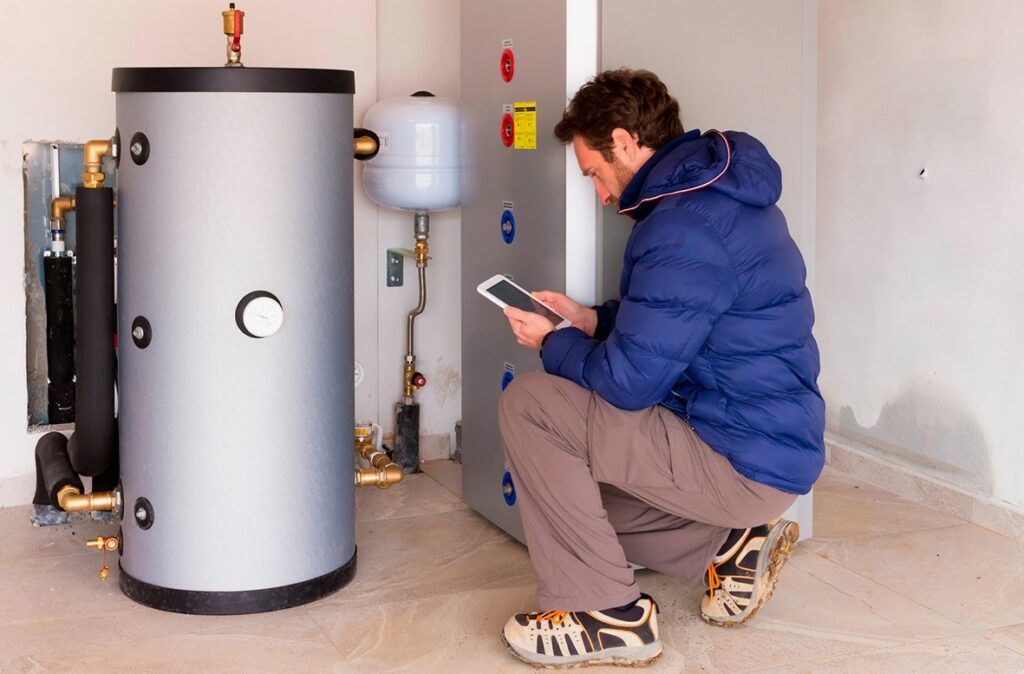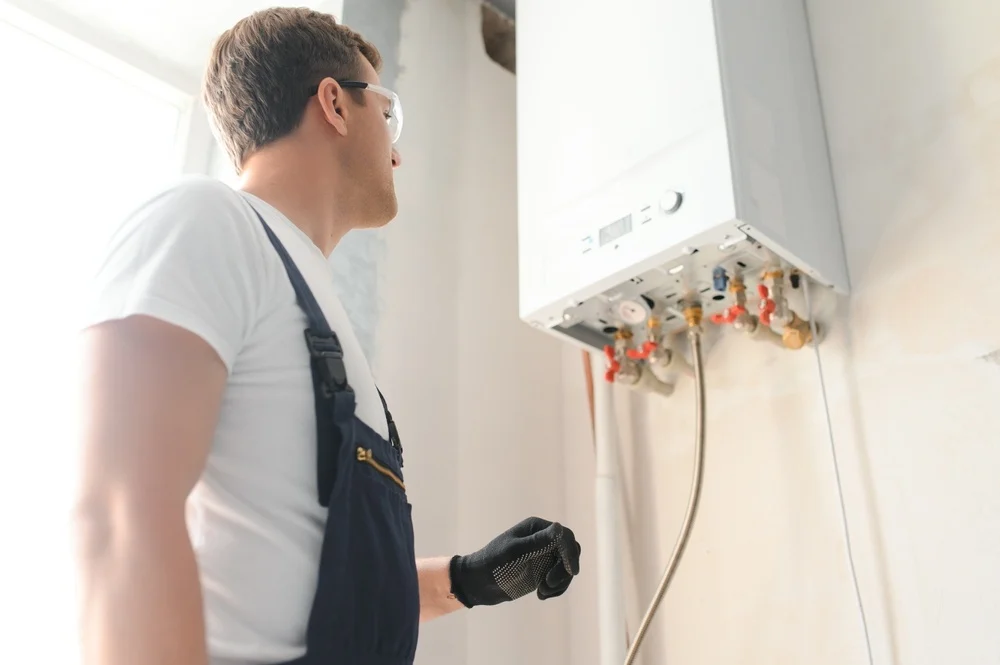Replacing a boiler isn’t something you do every day, so it’s natural to wonder how long the job will actually take. The truth is, timing depends on the type of boiler, the complexity of your system, and whether you’re upgrading or swapping like-for-like.
This guide breaks it down so you know what to expect and can plan with confidence.
How long does it take to replace a boiler?
Most boiler replacements take 1–3 days, with simple swaps done in a single day and complex upgrades requiring longer.
Key Takeaway
- Average replacement: 1–3 days
- Like-for-like swap: ~1 day
- Upgrades or relocations: 2–3+ days
- Delays caused by old systems, new fuel types, or added extras
Average Timeframe for Boiler Replacement

Swapping out a boiler isn’t an all-day Netflix binge, but it’s not instant either. On average, you’re looking at one to three days depending on the job.
A like-for-like replacement in the same spot? Usually wrapped up in a single day. If you’re moving the boiler or switching from, say, oil to gas, expect a couple more days for pipework and safety checks.
Factor in that the engineer might need to flush the system or upgrade controls. That can add extra hours but saves you headaches down the road.
Bottom line: expect a day or two of disruption, but with the right boiler repair in Cumberland, you’ll be back to hot showers in no time. If you’re planning ahead, it also helps to know how much does it cost to replace a boiler so you’re prepared for future expenses.
Factors That Affect Replacement Time
Not every boiler swap runs on the same clock. A quick switch can be wrapped up in a single day, but add a few curveballs and you’re looking at extra time. Knowing what is a combi boiler can also shape the timeline, since different systems require different steps.
First, the type of boiler matters. Swapping like-for-like is a breeze, but upgrading from a combi to a system model means extra pipework and possibly new tanks. More parts equals more hours.
Next, your home’s setup plays a big role. If your system’s older than your favorite retro console, expect extra work to get it up to code. Engineers may need to reroute pipes or upgrade controls before the new unit even lands.
Accessibility is another sleeper factor. A boiler tucked neatly in the kitchen? Easy. But if it’s hidden in a loft or tight cupboard, you’re looking at ladder climbs, awkward angles, and extra labor. It’s the kind of setup that also makes you wonder, do I need a new oil tank when replacing boiler, because space and access can seriously affect the job’s complexity.
Don’t forget about the extras. Whether you’re adding smart controls, new radiators, or scheduling when new boiler need its first service, each step adds a bit more time but pays off in long-term performance. Think of it as an investment in future-proofing your comfort.
Finally, paperwork and safety checks can’t be rushed. Gas and building regulations mean everything has to be tested, certified, and signed off. Whether it’s routine certification or something more urgent like boiler repair in West Warwick, skipping these steps just isn’t an option.
Bottom line: the replacement time depends on your setup, the upgrades you want, and how easy the install is. If you’re planning something like a boiler repair in Lincoln, knowing these factors upfront helps you plan smarter and avoid surprise delays.
Step-by-Step Boiler Replacement Timeline
- Initial Inspection (1–2 hours): The engineer checks your current system, pipework, and gas supply. This is the “let’s see what we’re working with” phase.
- Shutting Down the Old Boiler (30–60 minutes): They power down, disconnect, and safely remove the old unit. Think of it as clearing the stage before the main act.
- Prepping the Area (1–2 hours): Pipes might need tweaking, walls drilled, or brackets fitted. It’s basically set design so your new boiler fits right in.
- Installing the New Boiler (3–6 hours): This is where the magic happens. The engineer mounts, connects, and secures the new unit, making sure every joint’s locked tight.
- System Flush (1–2 hours): Old sludge and debris get cleared out of your pipes. Fresh start means better efficiency and fewer breakdowns.
- Wiring & Controls (1–2 hours): Smart thermostats, timers, and safety systems get hooked up. This is the tech flex that makes your boiler user-friendly.
- Testing & Safety Checks (1–2 hours): The engineer fires it up, checks gas pressures, and scans for leaks. It’s the dress rehearsal before the big show.
- Handing Over (30–60 minutes): They’ll walk you through controls and care tips. By now, you’ve got hot water, heating, and peace of mind.
On average, the full process takes 1–3 days, depending on complexity, and factors like boiler replacement cost can also influence the overall timeline.
Special Cases That Take Longer
Not every boiler swap is a quick in-and-out. Some jobs stretch the clock.
If you’re switching fuel types, like oil to gas, expect extra days. New pipework, venting, and permits all add to the timeline. It’s a bigger flex but also a bigger project.
Moving your boiler to a new location? That’s another time-eater. Rerouting pipes and flues means more wall chasing and floor lifting. Basically, it’s like moving a kitchen island—not impossible, just slower.
Old homes with dated systems can be unpredictable. Corroded pipes, faulty wiring, or asbestos insulation often slow things down, and sometimes even the boiler for residential use needs to be replaced before progress can continue safely.
Bottom line: standard swaps are fast, but if your upgrade involves major changes, build in a little patience. The payoff is a system that’s safer, more efficient, and ready to last.
Tips to Speed Up the Process

Clear the work area before the installer shows up. A boiler tucked behind boxes or furniture only slows things down.
Have all decisions made ahead of time, like where the new unit goes or if you’re upgrading pipework. Changing your mind mid-job adds hours, sometimes days.
Stick with a reputable installer who knows the brand you’re getting. Pros who’ve done the same setup a hundred times move quicker and smoother than someone figuring it out on the fly.
Frequently Asked Questions
1. How long does a boiler replacement take?
Most swaps land between 1–3 days. A straight swap is quick, but upgrades like moving the boiler or adding new pipework take longer.
2. Can I still use hot water during replacement?
Usually not. You’ll be without heating and hot water until the new system is up, so plan ahead.
3. Do I need to be home the whole time?
Not necessarily. Be there for access and questions, but you don’t need to hover.
Conclusion
Swapping out a boiler isn’t an all-day soap opera. Most replacements land in the 1–3 day range, depending on how fancy your setup is. Straight swap? You’re likely sorted in a single day.
The trick is planning. Clear access, a pro installer, and knowing your system’s quirks keep delays at bay. Think of it like upgrading your phone, set it up right, and you’ll barely miss the old one before the new heat kicks in.